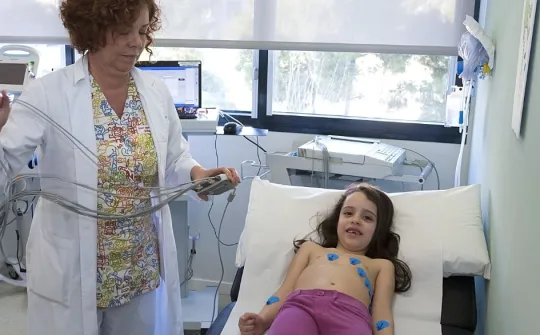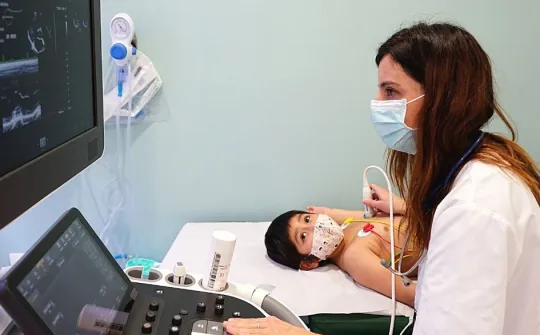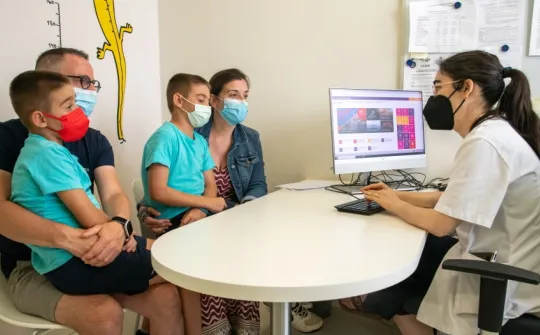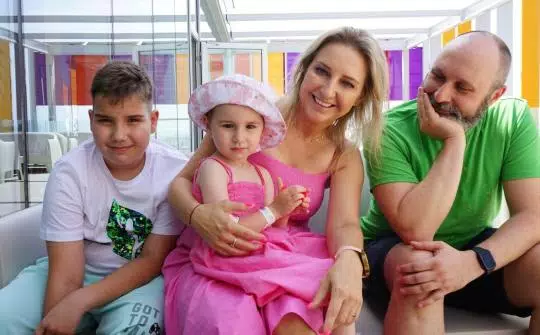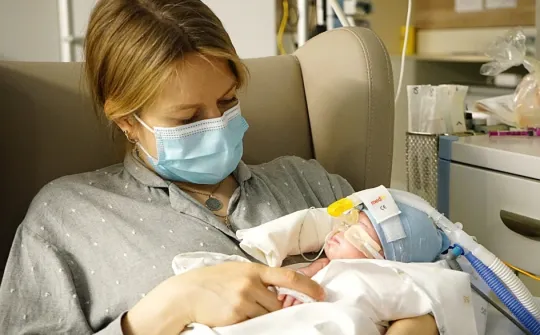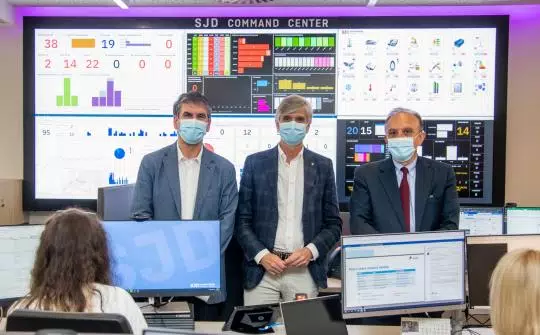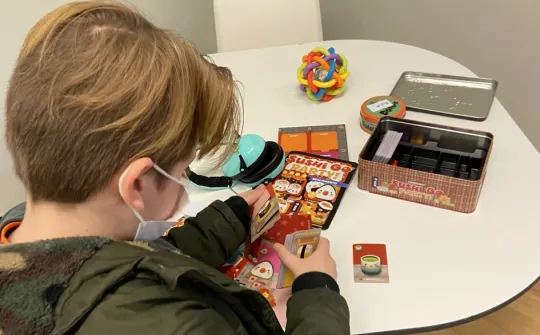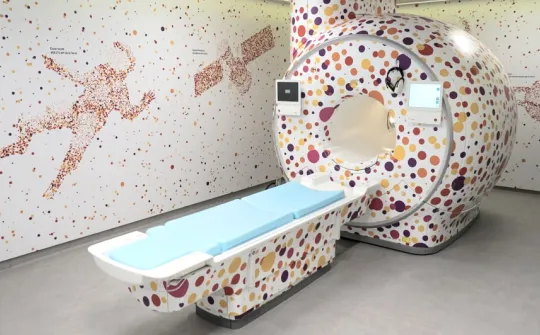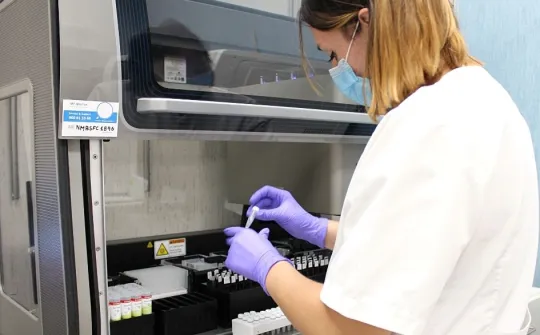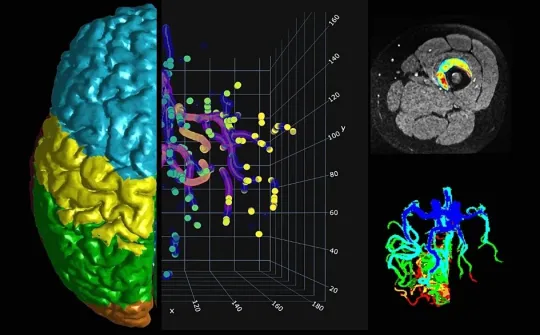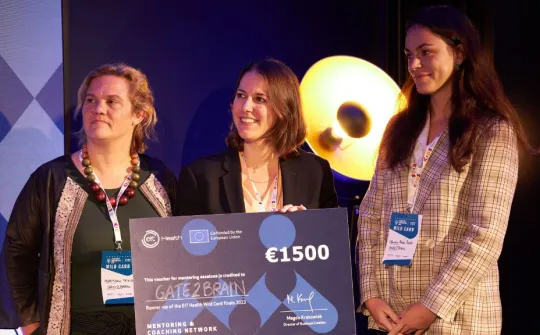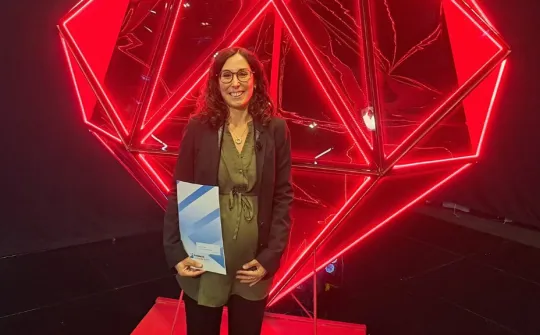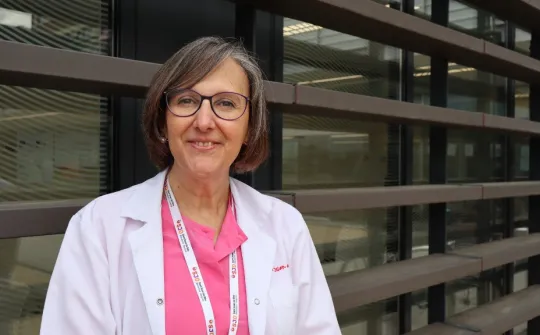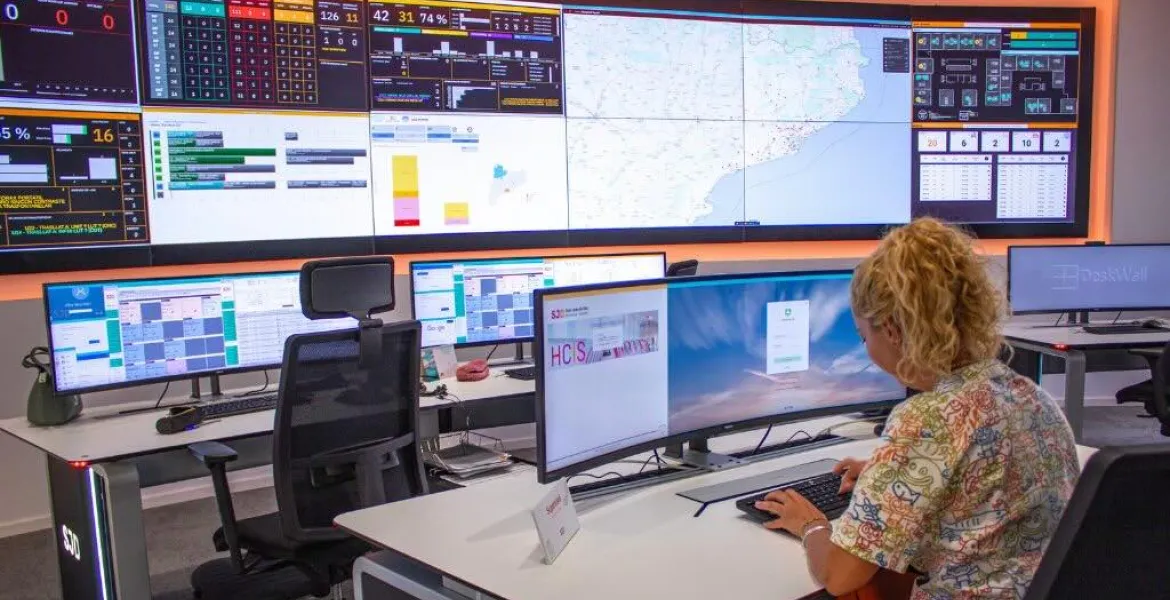
In line with SJD Barcelona Children's Hospital’s policy on transparency, the figures related to its work are available to the general public.
An overview of 2023
In this spirit of transparency, we make the information from the past five years about our annual work as a hospital and research centre available to the general public, in addition to other useful information.
This year’s milestones
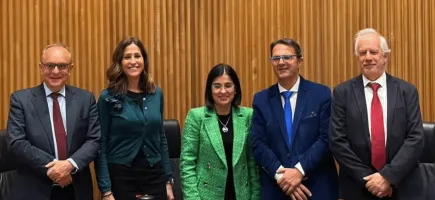
On 28 February, World Rare Disease Day, the Únicas network was presented to Spain’s Congress of Deputies. This network, overseen by SJD, is made up of 25 hospitals, research centres and the Spanish Federation of Rare Diseases (FEDER).
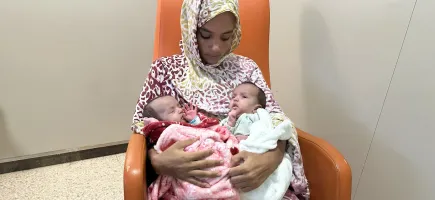
Two Siamese twins from Mauritania were operated on thanks to the charity programme Cuida’m run by SJD Barcelona Children's Hospital. The twins are now in a perfect state of health and lead a normal life.
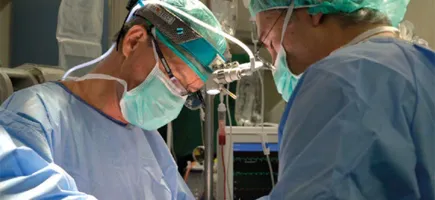
A nationwide project intended to mitigate the current problems of the healthcare system in giving comprehensive care to patients with a rare disease and their families. Promoted by the Hospital, it was behind the setting up of a domestic network of hospitals that did the most paediatric work.
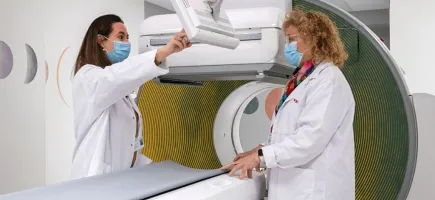
In March 2023, the Nuclear Medicine Unit started work on some new facilities housed at the SJD Pediatric Cancer Center Barcelona. These new facilities of around 1,000 m2 have two SPECT scanners, a state-of-the-art PET-CT scanner and a densitometer.
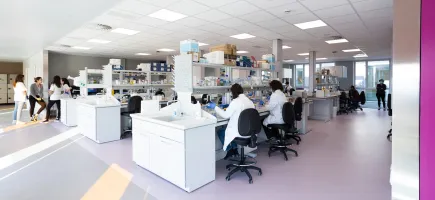
The new laboratories to start research into solid tumours funded by the savings bank La Caixa were opened in 2023. The result of an institutional agreement with the Biomedical Research Institute (IRB), this saw the creation of the first post of a principal investigator with dual affiliation between the IRB and SJD.
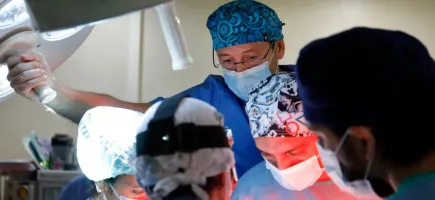
This is a highly complex scientific project set in motion by the La Caixa Foundation intended to come up with an alternative method to the current technology to naturally replicate the uterus, in order to increase survival rates, whilst reducing the serious side effects that most extremely premature newborn babies suffer.
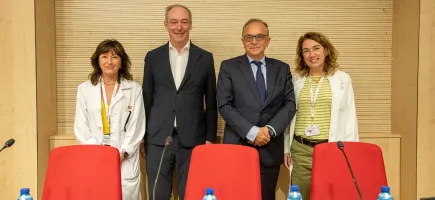
SJD and Zúrich España have set up the Henka programme to enhance emotional well-being. It is intended to encourage the emotional well-being of young people between 12 and 16, as well as to raise awareness in society so that mental health becomes a priority in schools.
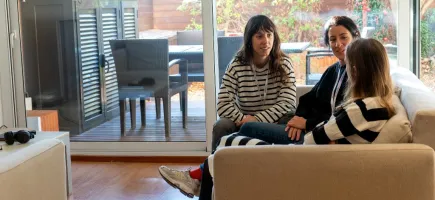
In June 2023, a new healthcare programme was launched to provide an innovative response to the healthcare needs of the most complex cases of patients with eating disorders (EDs) who require highly specialised treatment.
The Clinical Command Center (CCC) has put forward a new healthcare model for complex paediatric patients, the C3AP project. This is a partnership between SJD and three primary care centres (Metro Sud, Centelles and Alt Urgell) to improve the care given to child patients with chronic illnesses, based on the use of remote monitoring technology and artificial intelligence, as well as on a healthcare model spread across different levels of treatment. In the first phase, 20 patients with different levels of complexity will be screened, in order to classify interventions and their subsequent scaling.
In March 2023, the Family Council was set up at the SJD Pediatric Cancer Center Barcelona, made up of 16 families. Its mission is to identify and propose actions for improving healthcare from the perspective of the families of patients treated at the Hospital. In 2023, one meeting was held to present the Council and another to focus on the process for emergency admissions. The members of the Hospital’s Family Council and Youth Council have been extremely proactive in the work they do.
The SJD Pediatric Cancer Center Barcelona has had a new facility built: the Advanced Therapies Platform that covers a total of 1,300 m2. The project consists of an R&D laboratory designed to develop new therapies, a production area with four cleanrooms, spaces for administrative staff, and a cryopreservation room for samples and products in liquid nitrogen tanks.
In order to respond to the needs for space in the short-term, a building has been leased on Carrer Urgell in the centre of Barcelona. The building has eight floors, two of which are basements, and a total surface area of 3,600 m2. In 2023, the first alterations were executed that have enabled several departments such as Clinical Documentation, the Diabetes Clinic and the MIND Schools to move into the building. Work is currently being done to be able to house the extension of the School Learning Disorders Unit (UTAE).
Curing and caring
In 2023, SJD equalled and, in some cases exceeded, pre-pandemic levels of work. It is particularly worth pointing out the hike in remote appointments (40% of outpatients work) and the continued high levels of patients with complex conditions discharged from hospital.
Hike in remote appointments and complex care for hospitalised patients
In 2023, SJD equalled and, in some cases exceeded, pre-pandemic levels of work. It is particularly worth pointing out the hike in remote appointments (40% of outpatients work) and the continued high levels of patients with complex conditions discharged from hospital.
There has also been a gradual rise in the demand for care by international patients, despit the complex geopolitical situation. The forecast for 2024 is a moderate growth (5%) of international patients, the consolidation of recent healthcare projects (SJD Pediatric Cancer Center Barcelona, Casa de Sofia and Child and Adolescent Mental Health) and the work on other new projects that target the care of rare diseases (Congenital Cardiopathy Centre, the Únicas SJD Building and the Advanced Therapies Platform).
There was a negative impact on the number of international patients treated for two reasons: the war between Ukraine and Russia, and the withdrawal by the authorities of free naxitamab for childhood neuroblastoma.
Highly-specialised care provision
By choosing to specialise in pediatric healthcare, we have made several huge steps in the field, such as the creation of comprehensive, monographic healthcare facilities like the Pediatric Cancer Center Barcelona and La Casa de Sofía.
Our offering of high-complexity procedures has been widened thanks to the incorporation of augmented reality in surgical procedures, the approval of 3D surgical planning and new at-home healthcare programmes in high-complexity oncology and mental health cases.
- Transcranial magnetic stimulation system: The Pediatric Neuromodulation Unit has incorporated a new transcranial magnetic stimulation system into their unit. This new diagnostic and therapeutic technology can generate a 3D model of internal brain structures, creating a functional map of the eloquent motor and linguistic regions. This map can be transferred to the surgical planning station and then, if needs be, to surgical neuronavigation. From a therapeutic perspective, this technology is used to treat neuropsychiatric symptoms, neurodevelopmental symptoms, and those arising from neurovascular damage.
- Consolidating the role of the hospital pediatrician: The hospital pediatrician assumes responsibility for medical decisions made about patients admitted to the surgical department. In 2022, we evaluated the proof of concept carried out in the neurosurgery, general surgery and orthopedics and traumatology wards. The results support the suitability and proposed expansion of this new care programme that seeks to provide surgical patients with comprehensive care and which focuses a large part of its efforts on managing pain and anxiety.
- Sports medicine as a therapeutic option: The Sports Medicine Department, created in 2014, offers targeted services for both the general population and also amateur sports players. It involves the use of physical activity and sport as a preventative and therapeutic measure in healthcare. As such, having a sports therapist's perspective at the SJD Barcelona Children's Hospital can only be beneficial to patients and staff. During 2022, this department supported and worked alongside several other clinical departments, both on a preventative and a therapeutic level: Endocrinology, Women’s Health, Cardiology, Mental Health, Oncology and Health Education.
SJD’s Neurosurgery Department successfully operated on a Belorussian boy who at the age of three started to have epileptic seizures resistant to all drugs, caused by a birth defect, a hypothalamic hamartoma.
Comprehensive care
The Hospital's various initiatives and programmes go beyond our patients’ medical needs.
Guide for teenagers transitioning to adult hospital
The Hospital has published the A10! Digital Transition Guide, a tool for pediatric patients and their families to help them through the transition to adult hospital. 1,497 transfers had taken place up until October 2022, 50% of which corresponded to patients with rare diseases. The main receiving hospitals were Hospital Clínic Barcelona, Bellvitge, Vall d’Hebron and Sant Pau.
Throughout 2022, new ties have been established with other adult hospitals (Parc Taulí, Mataró or Granollers, among others) and other institutions (Aspace). Among other highlights, we have created specific protocols and carried out various group visits for patients and their families to both the pediatric and adult hospitals. We have also assessed the programme from three perspectives: the patient experience; the professional experience and the institutional vision, which have allowed us to develop a new improvement action plan.
Spiritual care (SAER)
The Spiritual and Religious Care Service (SAER) has been working hard throughout 2022 to improve its service offering and help raise awareness. On a care level, it has increased activity in more complex areas of the Hospital, such as the Neonatal Unit, La Casa de Sofía, the Palliative Care and Chronic Complex Patients Department and also in the PCCB. The huge progress made by integrating spiritual care into basic healthcare provision is clear to see. Plus, the SAER organises two in-person meditation programmes at the Hospital, as well as the Sonidos del Silencio (Sounds of Silence) SJD podcast, developed in collaboration with the Marketing and Communications Department. Finally, the SAER service brings huge educational and investigative value to the Hospital.
Social work
The Social Work Service has helped a total of 3,545 families (over 11,763 visits). The SJD Obra Social has helped 983 different families by providing food, transport, interpreters, orthodontic treatment, or paying the costs of other health needs that are not covered by public health.
Furthermore, a collaboration agreement has been set up between the SJD Barcelona Children's Hospital, the University Hospital of Bellvitge and other associations of patients with inherited retinal dystrophy, with the aim of providing social support to families with children affected by this disease. Moreover, we held the first edition of the training course in Infancy and Health: Social and Healthcare in the Hospital Context (Aula de Pediatría SJD [SJD Pediatrics Classroom]).
Hospital Amic
- Child Life: In 2022, the Child Life Service helped 2,333 patients and families in the hospital, and another 111 patients and families in La Casa de Sofía. The team has also expanded to the PCCB, where they have integrated a Child Life member into the team, participating in hospital huddles and in transfers to the Day Hospital. They have carried over various activities from Hospital Amic (art, music, clowns) and, as a new addition, introduced canine assisted therapy in the Outpatient Department. They have also launched new group activities in art and music, originally from the ‘La Fábrica de Magia [The Magic Factory]’ volunteering programme. As well as using magic as a therapeutic resource, both on pediatric wards and in the PCCB, children with retinoblastomas in the Ambulatory Surgery Department (UCA) are now also able to practice yoga. At La Casa de Sofía, we have also added music to the programme (in particular, our violin-playing pediatrician), as well as art, clowns, and game workshops run by volunteers.
- Volunteering: The volunteer team has reached 300 members, consolidating their work at La Casa de Sofía and the PCCB. We launched other new activities and programmes in 2022, such as: ‘Hospitality’, to detect the individual needs of patients we were welcoming to the Hospital; ‘Summer Youth Volunteers’, for teenagers aged 16-18 who want to help out at the PCCB; ‘Music in the hall’, where music students, patients, families and our faculty members liven up the Hospital reception with music; and even the celebration of the 1st edition of book editors inspired by patient experiences in the Hospital. A particularly significant project was ‘La Fábrica de Magia [The Magic Factory]’, which seeks to ensure all patients have the right to play and fun. To do this, volunteers and collaborators donate their time and skills to run fun, playful activities. Between February and October 2022, over 88 workshops took place, with 598 patients and 615 parents taking part.
The SJD Pediatric Cancer Center Barcelona successfully treated a boy who had a brain tumour with no possibility of a cure using two drugs normally administered to adults with lung cancer
Participative, efficient organisation
Getting professionals involved in departmental organisation and decision-making is a fundamental requirement.
Flat Management-style system
- Huddles strategy, a system that uses short meetings to facilitate multidisciplinary discussion of a situation in any of the 23 departments across the Hospital.
- Grupo Operaciones Asistenciales [Healthcare Operations Group] (GOA), a coordination effort in which professionals from various healthcare fields come together to discuss, agree on and implement processes, with a view to both activity level and quality. This model has been replicated in larger areas such as Mental Health and the PCCB.
- Healthcare hub, consisting of weekly meetings with upper management and heads of departments, nursing, and the Planning, Patient Experience and Quality, and International departments.
Clinical safety
- Promoting safe practice (considering aspects ranging from correct patient identification to medication safety).
- Prevention and control of infection (with hand-washing being a key element).
- Safe surgery (to plan out and ensure adherence to checklists during scheduled surgical procedures).
- Safety incident report management (with a decentralised model, multidisciplinary analysis and professional response).
EMC2
The EMC2 improvement model has been just as active, with 2022 seeing new additions to the management teams of both Innovation and People and Values, bringing fresh perspectives to our work. One of our newest innovations has been incorporating quicker methodology to develop smaller-scale projects.
We have workde on 59 improvement plans in line with the EMC2 model, ranging from the Respir programme for families, to care in A&E.
Budget balancing
Yearly billing in 2022 has reached 299 million Euros, with a continually balanced cash flow. Staff pay has increased by 3.5%. This increase in costs has been financed by a rise in CatSalut tariffs (+3.49%).
Diversifying funding
Our strategy to diversify our funding routes helps us keep a balanced cash flow: launching the Hospital Friend programme, renovating the technology park, maintaining high levels of research activity, and running charitable projects.
A multidisciplinary team from SJD’s Oncology, Orthopedic Surgery and Traumatology departments operated on a Ukrainian boy with osteosarcoma, a malignant bone tumour that affects children and adolescents.
New knowledge
Research and clinical trials, as well as innovation, have been crucial in our progress as a centre in 2022.
Creation of the Data Office
The Hospital has created the Data Office (DAM&GO), a body to manage the efficient organisation of Hospital data in response to growing healthcare, administrative and investigative data needs.
In 2023, the rate of hospitalisation at the SJD Pediatric Cancer Center Barcelona reached 78%, which required all of the rooms available to be put into service.
The SJD Pediatric Cancer Center Barcelona reaches full capacity
In 2023, the rate of hospitalisation at the SJD Pediatric Cancer Center Barcelona reached 78%, which required all of the rooms available to be put into service.
At the Day Hospital, there was a daily average of 30 appointments, 48 tests and six operations in the operating theatres of the SJD Pediatric Cancer Center Barcelona. Over the year, the number of patients admitted in unofficial circumstances increased, whilst the number of private international patients dropped due to the fall in patients with neuroblastoma. The satisfaction of patients and their families still remained at very high levels (NPS of 87.07), thanks to the comprehensive care model. Insofar as infrastructures are concerned, a Pharmacy Unit, a Nuclear Medicine Unit and a second operating theatre (BQ17) were opened.
One year after it was set up, Casa de Sofia has established itself as a intermediate paediatric care facility, whose workload is ever growing, with patients in convalescence accounting for most stays.
Casa de Sofia increases its workload and level of engagement
One year after it was set up, Casa de Sofia has established itself as a intermediate paediatric care facility, whose workload is ever growing with patients in convalescence accounting for most stays.
The centre has rolled out new services such as ventilators for the patients admitted there, the outpatients programme for adjusting respiratory support devices and putting dressings on patients with epidermolysis bullosa. Other actions include the recruitment of a new nursing manager and the programme for identifying vulnerable families found to be at risk by social services.
The Acompanya’m programme has been recognised through Next Generation funding so that the Post-Acompanya’m project could be started up. It consists in communities giving support to young people with serious mental health issues and a highly complex social and family background towards a sustainable transition to adult life.
Post-Acompanya’m, a sustainable transition to adult life
The Acompanya’m programme has been recognised through the EU's Next Generation funding so that the Post-Acompanya’m project could be started up. It consists in communities giving support to young people with serious mental health issues and a highly complex social and family background towards a sustainable transition to adult life.
This project has increased what the Acompanya’m is able to offer by enhancing support thanks to the availability of assisted living facilities that have been opened. The primary objective is for young people formerly in care to become totally emancipated by encouraging their deinstitutionalisation in a flat of their own, raising awareness in families and communities abit the problems of these young people who are highly vulnerable, at the risk of revictimization and with low social capital. The project has the support of more than 30 healthcare professionals from Acompanya’m, the Suara Cooperative, the SJD Research Foundation and the University of Vic-Central Catalonia.
Awareness
The scientific output from the SJD Research Institute (IRSJD) continued its upward trend in 2023 with more than 650 papers, which had an overall impact factor of more than 5.000 points for the first time.
The number of clinical trials and observational studies conducted by the Clinical Research Unit (URC) continued an upward trend with 315 studies underway. In so far as the subject matter is concerned, the number of clinical trials on rare diseases was well ahead, which account for 68% of all of the research work.
Clinical research
The number of clinical trials and observational studies conducted by the Clinical Research Unit (URC) continued an upward trend with 315 studies underway. In so far as the subject matter is concerned, the number of clinical trials on rare diseases was well ahead, which account for 68% of all of the research work.
Recruitment has also started for the clinical trial directed by Susana Rives, who uses CAR-T19 cells currently made in a partnership between Barcelona’s Hospital Clínic and SJD Barcelona Children's Hospital. This is a phase 2 multicentre trial that is focusing on relapsed and refractory paediatric patients with acute B CD19+ lymphoid leukemia. It is supervised by the SJD Research Institute and is subsidised by the Carlos III Health Institute.
In 2023, the SJD Research Institute (IRSJD) was granted provisional membership of the the CERTERA Consortium, a nationwide network for developing advanced therapies.
Membership of the CERTERA Consortium
In 2023, the SJD Research Institute (IRSJD) was granted provisional membership of the the CERTERA Consortium, a nationwide network for developing advanced therapies.
The funding received will smooth the path for setting up a platform for advanced therapies and will bolster the IRSJD’s position as a relevant stakeholder in Spain in this field.
Around 40% of the courses run for external healthcare professionals have been customised to cater for outside institutions. Thus, in the framework of the Vincles programme, courses have been given to primary healthcare doctors who work in the SJD catchment area.
Customised courses
Around 40% of the courses run for external healthcare professionals have been customised to cater for outside institutions. Thus, in the framework of the Vincles programme, courses have been given to primary healthcare doctors who work in the SJD catchment area.
In 2023, almost 900 healthcare professionals were trained. In addition, training courses were promoted that concentrated on preceptorship, which gives students an immersive experience in a unit or enables them to learn about a specific disease for a limited period of time. These programmes are carried out in the Hospital’s healthcare settings such as its Rheumatology, Epilepsy, Orthopaedic Surgery and Maxillofacial Surgery departments. A number of conferences and webinars have been run about specific diseases: CONendo (endocrinology), general paediatrics and type I diabetes are just a few examples.
The FAROS health observatory became fully affiliated to the Health School, Escola de Salut Sant Joan de Déu. The project to set up a new platform for the Health School gave the opportunity to conduct a thorough review of all of the contents published by FAROS since its launch in 2008 (around 9,200 posts) to select and update its information and learning resources
The SJD Health School’s website
The FAROS health observatory became fully affiliated to the Health School, Escola de Salut Sant Joan de Déu, for the first time in 2023. The project to set up a new platform for the Health School gave the opportunity to conduct a thorough review of all of the contents published by FAROS since its launch in 2008 (around 9,200 posts) to select and update its information and learning resources.
In addition to seeing through the whole of the process of migrating to the new platform, contents in all formats continued to be posted on the portal at the same rate as in the past, which resulted in 150 new publications.
Furthermore, the recipes that SJD concocts together with the Alícia Foundation were tweaked in 2023. The more modern and dynamic format makes it easier to see the contents displayed and better adapts to the formats used by social media.
In 2023, 266 simulation activities were run to train staff (SIMTrain): 97 editions of courses and 169 sessions, which included skills workshops and on-site simulations that form part of the work of various hospital departments
Simulation projects adapted to the Hospital’s specific needs
In 2023, 266 simulationactivities were run to train staff (SIMTrain): 97 editions of courses and 169 sessions, which included skills workshops and on-site simulations that form part of the work of various hospital departments.
In the field of the simulation workspace design and work processes (SIMTest), five projects were completed: double cubicles in the day hospital, nuclear medicine rooms, nuclear medicine process for epilepsy, the second stage of AICCELERATE, the joint C2P2 project, and the UCB clinical trial.
Furthermore, in order to respond to some specific simulations and enhance their reality, work was done in 2023 on a number of partial models (SIMEngineering).
Commitment and quality
In the framework of the “Professional growth: new professional roles” project, the role of clinical assistant – who assists medical staff in handling administrative tasks – became established, and a further two new roles were put in place: case manager and advanced practice nurse (APN).
New professional roles
In the framework of the “Professional growth: new professional roles” project, the role of clinical assistant – who assists medical staff in handling administrative tasks – became established, and a further two new roles were put in place: case manager and advanced practice nurse (APN).
An APN is an expert nurse, trained in complex decision-making skills who also has expertise in advanced techniques. In 2023, 10 clinical assistants, one lead nurse and five advanced practice nurses were recruited. The suitability of introducing other professional roles also continued to be examined.
In 2023, 365 courses were taught in the framework of the annual training plan. The ultimate aim is to refresh and extend scientific and technical know-how in order to address the need for highly specialised skills, excellence in curing and caring, and improving the patient experience.
The strategy for attracting talent focused on nurses in 2023. Therefore, a campaign was run to recruit staff from the students in their final year at the SJD Campus.
Employer Branding plan
The strategy for attracting talent focused on nurses in 2023. Therefore, a campaign was run to recruit staff from the students in their final year at the SJD Campus.
Support was also given to four students thanks the the Young Talent programme, which enables them gain work experience at the departments of their choice at the Hospital. Lastly, the Mother and Child Scholarship programme was launched for student nurses at the Campus. Each student is awarded €12,600 and includes a two-year full-time employment contract.
On a broader level for the rest of the staff, SJD took part in the JoBarcelona event, which is a place where companies, universities and professionals can meet young people who have completed their training. It also engages in Esplugues Talent that is intended to find talent from among secondary school and other higher education students, whilst Innobus is a project that targets young people coming to the end of their degree course who are looking for their first opportunity in the job market.
The EMC2 quality model continued to have an impact on the ongoing improvements to SJD’s departments, for which the needs of patients and their experience of the care received take centre stage.
EMC2 (Excellence = Method, Know-How and Client)
The EMC2 quality model continued to have an impact on the ongoing improvements to SDJ’s departments, for which the needs of patients and their experience of the care received take centre stage.
Emphasis is also placed on the culture of working people so that they are able to concentrate their attention on patients and their families. A total of 49 projects were completed over 2023. The teams involved in User Support and Patient Safety were also joined by new recruits in 2023. Amongst other projects carried out, it is worth highlighting SJD’s Family Respite programme, the Staff Benefits programme, the improved organisation of the Ear, Nose and Throat, and the Orthopaedic Surgery departments, and the improved patient experience in the Haemophilia, Cancer Survivers and Sickle-Cell Anaemia units.
The programme for accrediting and certifying highly specialised skills in the fields of care to complex patients and rare diseases continued to be run in 2023. Besides the usual programmes (XUEC, CSUR and ERN), specific work was carried out to obtain the JACIE accreditation in the field of HSCT and, looking ahead, documents are being prepared for submission to the Joint Accreditation Committee
In 2023, a new formal model was designed, called Listening to Patients, which is based on listening to patients and their families, handling their requests and subsequently analysing the information collected. This has made it possible to find out in more detail the needs of patients and their families, and to put processes in place to enhance their experience.
A new Listening to Patients model designed by the User Support Unit
In 2023, a new formal model was designed, called Listening to Patients, which is based on listening to patients and their families, handling their requests and subsequently analysing the information collected. This has made it possible to find out in more detail the needs of patients and their families, and to put processes in place to enhance their experience.
This new method makes it possible for concerns to be expressed in numerous ways (in person, email, telephone, online, etc.), give priority to the handling of complaints that have had an impact on patients and their families, pass on words of thanks to staff and department that treat patients, set up an orderly map of surveys depending on the requirements of the information to be obtained, devise more suitable types of questionnaire and draw up reports with results. Furthermore, the User Support Unit has been given additional support by a sociologist specialised in market analysis and research
The model for handling incidents continued to obtain excellent results due to the great number of notifications that are linked to a high degree of safety, which is proof that the Hospital continues to make inroads into this issue.
Clinical safety
The model for handling incidents continued to obtain excellent results due to the great number of notifications that are linked to a high degree of safety, which is proof that the Hospital continues to make inroads into this issue.
This his has made it possible to roll out the wide range of associated actions: safe practices, the secondary victims programme and the involvement of families as stakeholders. In addition, in terms of training, a second refresher course was given on clinical safety, which had extremely high attendance figures.
Other actions carried out in 2023 included a review and redesign of processes using the EMC2 learning method and the roll-out of a course intended for healthcare professionals, in the shape of a second refresher course that was given on clinical safety.
Cyberhealth
In 2023, a new Patient’s Portal were designed and developed in order to enhance the tool’s usability, accessibility and efficiency.
Patient’s Portal
In 2023, a new Patient’s Portal were designed and developed in order to enhance the tool’s usability, accessibility and efficiency.
The new portal will integrate the e-consultation tool (eConsulta) with the Health Care Information System (HCIS). This will allow staff to receive, look up, reply and record asynchronous messages that they send directly to patients from the HCIS. Furthermore, over 60 functionalities have been added to encourage interactions with the Hospital, such as managing appointments, signing up to the portal online, tracking and requesting medical reports, and processing other administrative procedures.
SJD has worked on the development of the new functionalities required for the Contact Centre since the first semester of 2023.
Contact Centre
SJD has worked on the development of the new functionalities required for the Contact Centre since the first semester of 2023.
Amongst other features, the following can he highlighted:
- The drawing up of different online forms, scheduling appointments, medical and surgical admissions, administrative procedures, medical documentation, handling complaints and user support.
- The development of new functionalities in CRM in order to update the way patients and caregivers are contacted, patient alert messages sent, alerts and internal posts published, etc.
- The customisation of text messages for appointments and the development of a database for handling the Contact Centre’s knowledge base.
Two platforms were set up in 2023: Impact3 and Únicas-dades.
Platform for the Únicas project
Two platforms were set up in 2023: Impact3 and Únicas-dades.
Impact3
Impact3 is Únicas’ first digital project, which is promoted and run by SJD, that consists in setting up a network of six hospitals to share information about patients who have rare diseases. The minimum datasets have been defined in order to post them on SDJ’s information platform and to anonymously share them on this centralised hospital network.
Únicas-information
Overseen by the Secretariat General for Digital Health of the Ministry of Health in a scientific partnership with SDJ, work on the development of the Únicas technology platform was started. To do so, a group was set up of more than 175 healthcare professions specialised in rare diseases and five work groups have been set up to deal with healthcare, patients, diagnostics, advanced drugs and therapies, as well as with classification and standardisation.
Compassion: hospitality
Work continued to be carried out in 2023 on the Menni project, whose goal is to pinpoint the factors that set the way patients, their families and staff are dealt with, and to establish practices to bring them to the fore, in which hospitality plays a key role.
The Menni project: identity and attitudes towards people
Work continued to be carried out in 2023 on the Menni project, whose goal is to pinpoint the factors that set the way patients, their families and staff are dealt with, and to establish practices to bring them to the fore, in which hospitality plays a key role.
A multidisciplinary team has been set up and 332 people (228 family members and 104 members of staff) have taken part in this piece of research. Based on the four cornerstones to promote the Menni culture – hospitality, the ability to learn, customisation and flexibility – a number of courses of action have been implemented:
- Menni conversations (a time to bring about reflection and well-being, and to put across how to spread this to other people).
- Reward programme (specific public recognition of Menni attitudes and actions).
In 2023, the number of referrals rose by 46% as a result of a model based on stable coordination in hospitals. The SAER provides assistance by working alongside healthcare teams in designing patients’ care plans.
The work of the Spiritual Care and Religious Service (SAER)
In 2023, the number of referrals rose by 46% as a result of a model based on stable coordination in hospitals. The SAER provides assistance by working alongside healthcare teams in designing patients’ care plans
The SAER has been at the forefront in creating new group therapy programmes, together with the Social Work Service, in order to respond to the needs of patients with cancer from Latin America who come to SJD feeling extremely fragile and vulnerable.
In so far as teaching is concerned, the 7th edition of the Spirituality in Clinical Practice refresher course was run for around 60 students. It is also worth pointing out the SAER’s involvement in the post graduate and master’s degree courses specialised in comprehensive care, palliative care and paediatrics, in addition to in lifelong learning training programmes in several scientific societies.
In 2023, the Ambulatory Surgery Unit continued to run the Yoga programme for children suffering from retinoblastomas, in addition to other programmes started in 2022 (choirs, amateur dramatics, animal-assisted therapies, music and art in the Mental Health Department).
Hospital Amic extends is activities
In 2023, the Ambulatory Surgery Unit continued to run the Yoga programme for children suffering from retinoblastomas, in addition to other programmes started in 2022 (choirs, amateur dramatics, animal-assisted therapies, music and art in the Mental Health Department).
Amongst the new actions undertaken, it is worth highlighting the extension of the work of the puppeteers in the outpatients clinics, the start of similar activities at the SJD Pediatric Cancer Center Barcelona, the introduction of dogs at the outpatients clinics, and the launch of choirs and art groups for hospitalised children.
At Casa de Sofia, the Theodora Foundation continued its work (hospital clowns), art activities were arranged for patients in palliative care, CTAC gave dog-assisted therapies and the Ressò association provided music therapy. A model for providing schooling at the Hospital has also been set up.
A team of volunteers encourage play that is run from what is called the Magic Factory. Amongst its other activities, it gives more individual magic shows and shadow workshops than ever before, in which more than 2,500 patients and their families have taken part.
The programme promotes comprehensive care for patients to reduce their anxiety and fears during hospitalisation. In 2023, assistance was sought 5,413 times in response to the concerns of 2,359 patients and their families.
The Child Life programme adopted by the SJD Pediatric Cancer Center Barcelona and Casa de Sofia
The programme promotes comprehensive care for patients to reduce their anxiety and fears during hospitalistion. In 2023, assistance was sought 5,413 times in response to the concerns of 2,359 patients and their families.
In 2023, the Child Life programme was introduced at the SJD Pediatric Cancer Center Barcelona and Casa de Sofia. At SJD, new lines of work have been put in place, amongst which it is worth highlighting the pre-surgery preparation of patients in the Neurosurgery, Retinoblastoma and Epilepsy and HSCT units. Other new programmes were rolled out at the NICU, PICU and outpatient clinics, such as the PICU Diary project and the Siblings PICU Hospitalisation programme. Finally, in coordination with the psychosocial care team, support was given to patients and their families on the haemodialysis programme.
Corporate social responsibility
In 2023, SJD funded numerous programmes, projects and lines of research thanks to the philanthropic support of individuals, foundations, businesses and a variety of organisations. In total, their charity turned into €9.7 million in funding.
Fund-raising
In 2023, SJD was able to fund numerous programmes, projects and lines of research thanks to the philanthropic support of individuals, foundations, businesses and a variety of organisations. In total, their charity turned into €9.7 million in funding.
Charity projects run by SJD
One again this year, SJD staged the Inseparable Gala and the SJD Barcelona Children's Hospital Charity Night, in the framework of the Alma Festival. In addition, the Brave Children’s Music Festival was held, which was put on to mark the 50th anniversary of the Hospital moving from its old premises on Avinguda Diagonal in Barcelona to its current site in Esplugues de Llobregat.
Charity events organised by civil society
A total of 273 charity events were held in 2023 to raise funds for SJD. Most of the money was earmarked for research, but healthcare and humanisation programmes were also funded. A total of €1,606,000 was donated. Besides this, events run by many family associations managed to raise an additional amount of almost one million euros. Amongst many other family and private group events, the following stood out: Nights of the Full Moon in Sitges, the paddle tennis tournament #forçamiquel, Give me Wings, a jumble sale, the Charity Zambomba Festival, A Dream Christmas, the Charity Masroig Wine Fair, the Quimfants event to raise money for children with cancer, the El Prat Rotary Club Charity Race, the Rosaweek paddle tennis tournament, the Warriors Walk – In Rememberance of Jaume Bou, Shurikan Star, We’re Walking for You, Pol!, the Georgina de Miguel Antoja Tennis Championships, and the pro-PKU races, Run for Them and MTB for Them.
As part of its remit to do charity work, SJD Barcelona Children's Hospital is involved in a number of international projects.
International cooperation
As part of its remit to do charity work, SJD Barcelona Children's Hospital is involved in a number of international projects.
Twinning programme with Saint John of God Catholic Hospital in Sierra Leone
ith the support of foundations, businesses, private donors and SJD staff, once again this year the following programmes have been carried out:
- Sponsor the treatment of a child in Sierra Leone.
- Exchange of paediatric residents at the hospital in Lunsar (Sierra Leone).
- Nutritional rehabilitation programme.
- ICARIA research project.
Cuida’m (Take Care of Me) programme
In 2023, 25 children we able to receive highly specialised surgical treatment thanks to this programme. The patients came from the following countries: Algeria, Bolivia, Dominica, El Salvador, The Gambia, India, Madagascar, Morocco, Nicaragua, Pakistan, Peru, Senegal, Sierra Leone, Tanzania and Venezuela.
Since 2004, when the programme first started, Cuida’m has treated 420 cases involving families from 50-plus different countries.
SJD is striving to gradually reduce the waste it generates, restrict the use of anaesthetic gases, as well as to improve energy efficiency and increase the use of renewables.
Sustainability
SJD is striving to gradually reduce the waste it generates, restrict the use of anaesthetic gases, as well as to improve energy efficiency and increase the use of renewables that has now reached 100%.
It currently has the ISO 14.001 and EMAS environmental management certifications, and the SJD Pediatric Cancer Center Barcelona has obtained the BREEAM sustainability certification.
In order to reduce its carbon footprint, a number of actions have been carried out such as encouraging telemedicine, reducing the use of pressurised inhalers, purchasing drugs that have low carbon emissions and capturing anaesthetic gases. In 2023, investments were also made to improve the facilities’ energy efficiency. Thus, the Hospital’s façade was refurbished, which has resulted in energy savings of 30%.
The Hospital’s environmental strategy has given rise to the setting up of the SJD Sustainable Development Goals Committee, the revival of the Environmental Committee and the signing up to voluntary arrangements of the Government of Catalonia’s Catalan Office for Climate Change.
Recognition of professionalism
TOP 20 Awards
For the 21st year running, SJD has received recognition as being amongst the top 20 hospitals in the Global Hospital Management category for leading big regional and national hospitals. At the prize-giving ceremony, SJD was conferred the Best Paediatric Hospital Award. These awards are for hospitals in Spain that are given by the consultancy IQVIA following its review of their healthcare and financial management indicators.
Best Spanish Hospital Award
For the second year in a row, the consultancy Higia Benchmarking has given SJD the Best Spanish Hospital Award in the maternal and child processes category, based on a number of key indicators for the most common treatments delivered by acute care hospitals in Spain.
Montse Dolz, 2023 GENIO award winner
Montse Dolz, the head of the Mental Health department was the winner of the 16th edition of the GENIO awards, which are run by the mass media group Vocento and the consultancy Scopen. At the prize-giving ceremony Dr Dolz highlighted the importance of facing up to mental health problems so that we can grow as a society.
Gemma Gelabert appointed chair of the Clinical Documentation Technical Committee
Gemma Gelabert, head of SJD’s Clinical Documentation Department, appointed chair of the Clinical Documentation Technical Committee (CTMDC), which was set up in 2013 by the Government of Catalonia’s Ministry of Health to set homogeneous standards on the right to information concerning health, patient autonomy, clinical documentation and the publication of mainstream procedures.
Pau Miquel wins a Tenim Talent Award
The Catalan and Balearic Nursing Society recognised Pau Miquel, head of the Spiritual Care and Religious Service (SAER), by giving him a Tenim Talent Award, in the Hospital Care category.
This prize recognises the special talent, capacity, skills and attitudes of young healthcare workers with charisma who have made a big impact at their workplace and show future promise. These awards are given to young, talented nurses who have a bright future ahead of them.
Ignacio Barber appointed chair of the Spanish Society of Pediatric Radiology (SERPE)
On 4 May, Ignacio Barber was appointed chair of the Spanish Society of Pediatric Radiology (SERPE) in Santa Cruz de Tenerife.
Jaume Mora, wins the 2023 Social Talent Award
Jaume Mora, Scientific Director of the SJD Pediatric Cancer Center Barcelona, Director of Hemaetology and Director the Developmental Tumors Laboratory, received the 2023 Social Talent Award, which is given by the Impulsa Talentum Foundation in recognition of the most talented people in the region’s community of entrepreneurs. The money raised at the prize-giving ceremony was donated to the Anita Association, which is devoted to helping children and adolescents who have cancer.
Marta Ramon Krauel appointed chair of SEEP
Marta Ramon Krauel appointed chair of the Spanish Society of Paediatric Endocrinology (SEEP) for the 2024–2028 period. The appointment was announced on 12 May during the 45th national congress of the SEEP, held in Palma de Mallorca.
César Galo García Fontecha appointed chair of the Spanish Society of Paediatric Orthopedics
This appointment was made during the Spanish Society of Paediatric Orthopedics' 16th congress. It is a great homage to the career path of César Galo García Fontecha, head of SJD’s Orthopaedic Surgery Department by the Society’s, which was founded in 2008 for the primary purpose of promoting the study of this surgical specialty, and to contribute to its progress and expansion.
More awards for work
The Wild Card programme, promoted by EIT Health and i4KIDS, the innovation hub at SJD Barcelona Children's Hospital, gave awards to Innocens and Gate2Brain on Pediatric Innovation Day 2023.
Dr Patrícia García Cañadilla, who forms part of the Cardiovascular Diseases and Child Development research group at the SJD Research Institute, received funding from the telethon, La Marató, broadcast on the local channel TV3.
Carmen Muñoz-Almagro, head of the Infectious Diseases and Microbiome research group at SJD who received a Professional Excellence Award form the Barcelona Association of Doctors, explains the advances made in the field of infectious diseases in children and the human microbiome.
Results
Healthcare activity
- Accreditations: 21 ERN, 33 CSUR and 11 XUEC.
- A 78 % rate of hospitalisation at the SJD Pediatric Cancer Center Barcelona.
- More than 21,000 patients treated with a rare disease.
- A 16 % increase in the number of international patients looked after.
- Around 1,150 patients benefited from the programme to transfer them to an adult ward.
- A total of 613 complex patients were transferred by the SJD’s Emergency Medical Services.
- In all, 72.69 % of patients would recommend our Hospital (NPS score).
Research and innovation
- A total of 712 scientific papers with an overall impact factor of 5.021. This figure marks a 61 % increase in the papers published in scientific journals in the first quartile.
- A total of 261 clinical trials.
- €19.1 million in funding awarded to medical and research projects.
- Four patents granted.
Teaching
- Around 400 courses attended by 17,000 students run by SJD Education.
- A total of 266 simulation courses to train healthcare professionals.
- Five advanced practice nurse (APNs).
Corporate Social Responsibility
- A total of 273 charity events raised €1.5 million for the Hospital.
- €9.7 million received overall in donations.
- More than 5,700 treated in the framework of the Sierra Leone twinning programme.
